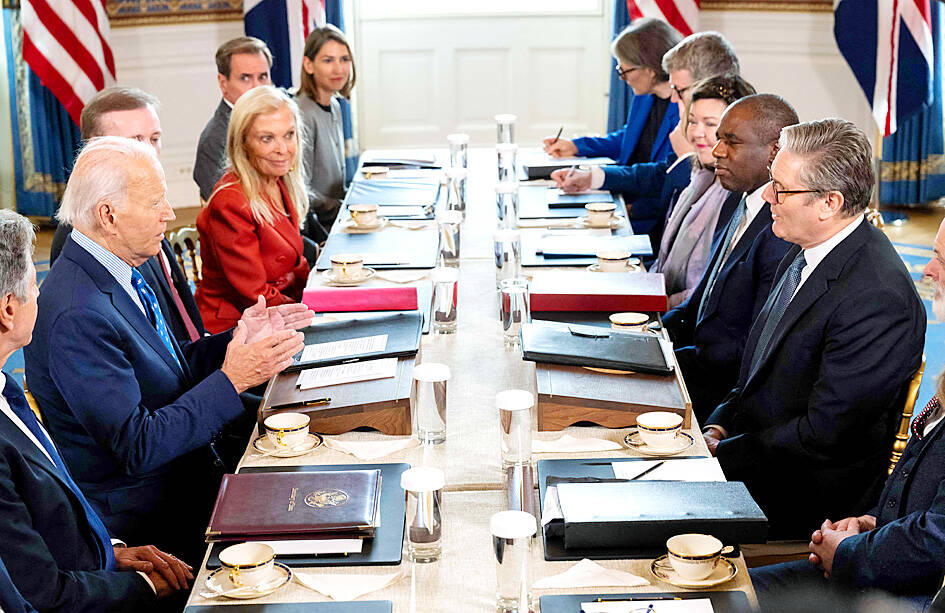British Prime Minister Keir Starmer and US President Joe Biden on Friday delayed a decision to let Ukraine fire long-range Western-supplied missiles into Russia, a plan that sparked dire threats from Moscow of a war with NATO.
Starmer told reporters at the White House that he had a “wide-ranging discussion about strategy” with Biden, but that it “wasn’t a meeting about a particular capability.”
Before the meeting officials had said Starmer would press Biden to back his plan to send British Storm Shadow missiles to Ukraine to hit deeper inside Russia as allies become increasingly concerned about the battlefield situation.

Photo: AFP
However, the Labour Party leader indicated that he and Biden would now discuss the plan at the UN General Assembly in New York later this month “with a wider group of individuals.”
As they met with their teams across a long table in the White House, backed by US and British flags, Biden played down a warning by Russian President Vladimir Putin that allowing Ukraine to fire the weapons would mean the West was “at war” with Russia.
“I don’t think much about Vladimir Putin,” Biden told reporters when asked about the comments.
However, while Biden said it was “clear that Putin will not prevail in this war,” he is understood to be reluctant to grant Ukraine’s insistent demand to be able to use long-range US-made ATACMS missiles against Russian territory.
US officials believe the missiles would make a limited difference to Ukraine’s campaign and they want to ensure that Washington’s own stocks of the munitions are not depleted.
The two leaders said they also discussed the war in Gaza, with Britain having recently suspended arms deliveries to Israel over concerns that they could be used to violate international humanitarian law.
The US, Israel’s main military and diplomatic backer, has held off such a step.
The White House had earlier played down the chances of a Ukraine decision coming from Friday’s visit by Starmer, the Labour leader’s second to the White House since he took office in July.
“I wouldn’t expect any major announcement in that regard coming out of the discussions, certainly not from our side,” US National Security Council spokesman John Kirby told reporters.
However, Ukrainian President Volodymyr Zelenskiy pushed Kyiv’s Western allies to do more.
Speaking in Kyiv, Zelenskiy accusing the West of being “afraid” to even help Ukraine shoot down incoming missiles as it has done with Israel.
Zelenskiy added that he would meet Biden “this month” to present his “victory plan” on how to end two-and-a-half years of war with Russia.

‘CORRECT IDENTIFICATION’: Beginning in May, Taiwanese married to Japanese can register their home country as Taiwan in their spouse’s family record, ‘Nikkei Asia’ said The government yesterday thanked Japan for revising rules that would allow Taiwanese nationals married to Japanese citizens to list their home country as “Taiwan” in the official family record database. At present, Taiwanese have to select “China.” Minister of Foreign Affairs Lin Chia-lung (林佳龍) said the new rule, set to be implemented in May, would now “correctly” identify Taiwanese in Japan and help protect their rights, the Ministry of Foreign Affairs said in a statement. The statement was released after Nikkei Asia reported the new policy earlier yesterday. The name and nationality of a non-Japanese person marrying a Japanese national is added to the

AT RISK: The council reiterated that people should seriously consider the necessity of visiting China, after Beijing passed 22 guidelines to punish ‘die-hard’ separatists The Mainland Affairs Council (MAC) has since Jan. 1 last year received 65 petitions regarding Taiwanese who were interrogated or detained in China, MAC Minister Chiu Chui-cheng (邱垂正) said yesterday. Fifty-two either went missing or had their personal freedoms restricted, with some put in criminal detention, while 13 were interrogated and temporarily detained, he said in a radio interview. On June 21 last year, China announced 22 guidelines to punish “die-hard Taiwanese independence separatists,” allowing Chinese courts to try people in absentia. The guidelines are uncivilized and inhumane, allowing Beijing to seize assets and issue the death penalty, with no regard for potential

‘UNITED FRONT’ FRONTS: Barring contact with Huaqiao and Jinan universities is needed to stop China targeting Taiwanese students, the education minister said Taiwan has blacklisted two Chinese universities from conducting academic exchange programs in the nation after reports that the institutes are arms of Beijing’s United Front Work Department, Minister of Education Cheng Ying-yao (鄭英耀) said in an exclusive interview with the Chinese-language Liberty Times (the Taipei Times’ sister paper) published yesterday. China’s Huaqiao University in Xiamen and Quanzhou, as well as Jinan University in Guangzhou, which have 600 and 1,500 Taiwanese on their rolls respectively, are under direct control of the Chinese government’s political warfare branch, Cheng said, citing reports by national security officials. A comprehensive ban on Taiwanese institutions collaborating or

STILL COMMITTED: The US opposes any forced change to the ‘status quo’ in the Strait, but also does not seek conflict, US Secretary of State Marco Rubio said US President Donald Trump’s administration released US$5.3 billion in previously frozen foreign aid, including US$870 million in security exemptions for programs in Taiwan, a list of exemptions reviewed by Reuters showed. Trump ordered a 90-day pause on foreign aid shortly after taking office on Jan. 20, halting funding for everything from programs that fight starvation and deadly diseases to providing shelters for millions of displaced people across the globe. US Secretary of State Marco Rubio, who has said that all foreign assistance must align with Trump’s “America First” priorities, issued waivers late last month on military aid to Israel and Egypt, the